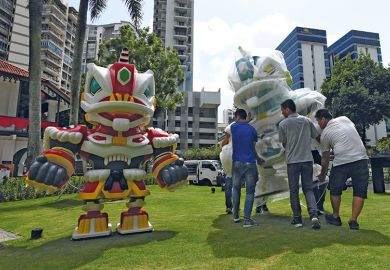This is the season when the US press runs article after article about how it was harder to get into the Ivy League this year than it was last. The stories suggest that the admissions is about gatekeeping.
But a tragic accident last week in which a truck hit a bus carrying high school students to Humboldt State University is a reminder that there are many people and programmes in admissions focused much more on opening gates than guarding them.
Among the 10 people killed was Arthur Arzola, 26, a Humboldt State admissions representative in Los Angeles and a graduate student in educational counselling at the University of La Verne. He not only recruited students for an admissions programme, but accompanied them on the long ride from Los Angeles to Humboldt State, the northernmost campus in the California State University System. While bodies are still being identified, 5 of the 10 dead are believed to be high school students.
The students were in Humboldt’s Preview Plus programme, which is for students who have been admitted to Humboldt State, but have not decided whether to enrol. The programme is specifically for low-income and first-generation students from Fresno, Los Angeles and San Francisco - students for whom enrolling at a campus in northern California may not be an obvious choice, despite Humboldt’s pride in the commitment of professors to teaching and outreach.
The students spend two days on the campus, getting a feel for the place, while also being briefed on the enrolment process and financial aid. The university pays all expenses, so students aren’t held back by lack of resources.
The programme works: about half of those who participate decide to enrol.
Mr Arzola was one of the reasons why scores of students from Los Angeles made the trip. He personally recruited them. He understood what it meant to work multiple jobs - not all of them glamorous - to achieve goals. On his Facebook page, he lists his work as being a graduate student; being an admissions representative; and being an associate at a fast-food restaurant.
One of the students he recruited wrote on Twitter: “Mr. Arzola, you were an amazing amazing person. Without your help I probably wouldn’t be where I am today. Thank you for everything.” Another wrote: “A big thank you to him, for motivating and advising my classmates and I.”
Mr Arzola’s stepmother, Stephanie Arzola, told The Los Angeles Times that he earned straight As in high school, and had previously worked as a counsellor at academic programs for underprivileged youth. “He wanted to make it an even playing field. He wanted them to have the same opportunities,” she said. “He always just wanted to help students be passionate about school and have them move on to higher education, make something of themselves, and have a career.”
La Verne officials said that this was the kind of work he planned to continue, and that he told professors he wanted to work on either the high school or college level, encouraging first generation students.
Mr Arzola, recently married to a La Verne alumna, was due to receive his master’s degree from the university next month. He got to know many of the admissions officers at La Verne, which shares the Cal State system’s emphasis on attracting low-income, first-generation students. He would see the other admissions representatives at events.
Candyce Coleman, associate director of transfer admissions at La Verne, said they regularly ended up at the same college fairs, and that he always had a smile. She described him as “one of those people that you would be happy to sit next to at a college fair for hours on end”. She saw him before the crash last week at a transfer fair and he told her how excited he was about graduation, that he “couldn’t wait to get his diploma”.




